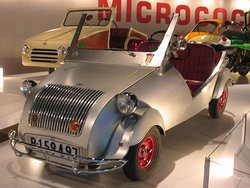Tuesday, January 03, 2006
Wikipedia v. Britannica - missing the point
 Nature magazine kind of missed the point with its recent Wikipedia/Britannica slapdown. What I want to know is, how well do the two perform in Six Degrees of Procrastination? In this game, which I invented last week, you follow interesting-seeming links from article to article and see how long it takes to get to a seriously weird entry that distracts you completely from your work.
Nature magazine kind of missed the point with its recent Wikipedia/Britannica slapdown. What I want to know is, how well do the two perform in Six Degrees of Procrastination? In this game, which I invented last week, you follow interesting-seeming links from article to article and see how long it takes to get to a seriously weird entry that distracts you completely from your work.I'll start the test with the most un-distracting topic I can think of: the European Union's Common Agricultural Policy. The CAP is a system of agricultural subsidies, funded by the European Agricultural Guidance and Guarantee Fund, that imposes tariffs and sets an internal intervention price to ensure that the internal market price of goods only varies in the blah blah blah blah blah.
Good choice, eh? Let's see how they do:
Britannica:
CAP : Kinds of farm operation : Peasant agriculture : the labour force : land, output and yields : blahblahblahblah
Wikipedia:
CAP : Fortress Europe : Autarky : Biscúter automobile
The Biscúter (above) was a microcar manufactured in Spain after WWII. It was roughly the size of two motorscooters, so it was originally called the Biscooter. (Awww.) Several body styles were produced, including a tiny woodie station wagon. (Go ahead, resist that woodie link! I dare you!)
And the winner is … Wait, what was I talking about?
Comments:
<< Home
The comparisons between Encyclopaedia Britannica and Wikipedia are very interesting.
Encyclopaedia Britannica never thought that an open source product like Wikipedia would seriously challenge the credibility of its brand. They were wrong and Encyclopaedia Britannica's staff seriously misread the global market. They are now very concerned about the widespread use of a free Wikipedia vs their paid subscription model. Industry analysis shows that the accuracy of both encyclopedic databases is similar.
It is interesting that Wikipedia founder Jimmy Wales is developing a new search engine. It is the combination of a) improved search engines and b) the success of Wikipedia that has put financial pressure on Encyclopedia Britannica over recent years. Many institutions and individuals are questioning the need to pay to subscribe to Encyclopaedia Britannica when the content is free on the internet. Google even has free direct links to Encyclopaedia Britannica's main database !!
Post a Comment
Encyclopaedia Britannica never thought that an open source product like Wikipedia would seriously challenge the credibility of its brand. They were wrong and Encyclopaedia Britannica's staff seriously misread the global market. They are now very concerned about the widespread use of a free Wikipedia vs their paid subscription model. Industry analysis shows that the accuracy of both encyclopedic databases is similar.
It is interesting that Wikipedia founder Jimmy Wales is developing a new search engine. It is the combination of a) improved search engines and b) the success of Wikipedia that has put financial pressure on Encyclopedia Britannica over recent years. Many institutions and individuals are questioning the need to pay to subscribe to Encyclopaedia Britannica when the content is free on the internet. Google even has free direct links to Encyclopaedia Britannica's main database !!
<< Home


